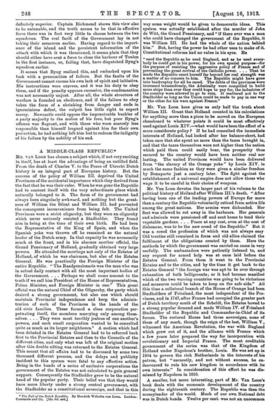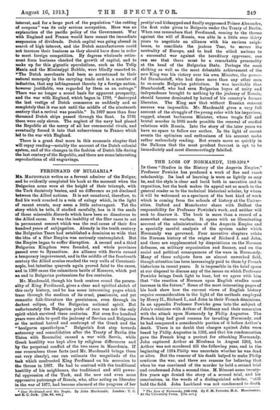A MIDDLE-CLASS REPUBLIC.*
Ma. VAN LOON has chosen a subject which, if not very exciting in itself, has at least the advantage of being an unfilled field. From the death of Charles V. to the Peace of Utrecht Dutch history is an integral part of European history. But the success of the policy of William III. deprived the United Provinces of the accidental importance which they derived from the fact that he was their ruler. When he was gone the Republic had to content itself with the very subordinate place which naturally belonged to it. The form of its government had always been singularly awkward, and nothing but the great- ness of William the Silent and William III. had prevented the consequent inconvenience from being felt. The United Provinces were a strict oligarchy, but they were an oligarchy which never seriously resisted a Stadholder. They found him in being at the time of their own birth. He had been the Representative of the King of Spain, and when the Spanish yoke was thrown off he remained as the natural leader of the Dutch army. In that capacity he was necessarily much at the front, and in his absence another official, the Grand Pensionary of Holland, gradually obtained very large powers. He attended the meetings not only of the Estates of Holland, of which he was chairman, but also of the Estates General. He was practically the Foreign Minister of the entire Republic. " The Raadpensionaris was the man who was in actual daily contact with all the most important bodies of the Government. . . . Perhaps we shall come nearest to the truth if we call him President of the House of Representatives, Prime Minister, and Foreign Minister in one." This great official was the natural Chief of the Oligarchy, the party which desired a strong government, but also one which should maintain Provincial independence and keep the adminis- tration of each of the Provinces in the hands of the old civic families. These formed a close corporation per- petuating itself, the members marrying only among them- selves. . . • They were most terribly jealous of one another's powers, and each small corporation wanted to be consulted quite as much as its larger neighbours." A motion which had been debated in the Estates General had to be referred back first to the Provincial Estates and then to the Councils of the different cities, and only what was left of the original motion after this double sifting was returned to the Estates General. This meant that all affairs had to be discussed by some two thousand different persons, and the delays and publicity incident to this system were fatal to any effective action. Being in the hands of a series of exclusive corporations the government of the Estates was not calculated to gain general support. Consequently the Stadholder grew to be the natural bead of the popular party. Their belief was that they would have more liberty under a strong central government, with the Stadholder as a constitutional sovereign, and that in this • The Fall of the Dutch Republic. By Hendrik Wilhelm van Loon. London: Constable and Co. [Us. 6d. net.]
way some weight would be given to democratic ideas. This system was actually established after the murder of John de Witt, the Grand Pensionary, and " if there ever was a man who could have changed the government of the Republic, it was William III. He had the whole of the nation behind him." But, having the power he had other uses to make of it. Constitutional reforms had no value in his eyes. He
"used the Republic as he used England, and as he used every- body he could get in his power, for his own special purpose—for the purpose of resisting the aggressive policy of France and of preventing the great revival of the Catholic power. . . That he made the Republic exert herself far beyond her real strength was a matter of no concern to him. The Republic might have gone into bankruptcy for all he cared. The debts of the provinces were increased tremendously, the Admiralty were compelled to build more ships than ever they could hope to pay for, the industries of the country were allowed to go to ruin. It mattered not to the Stadholder as long as the Union could be made to pay in one way or the other for his wars against France."
Mr. Van Loon here gives us only half the truth about William III. Grant that Holland counted in his calculations for anything more than a piece to be moved on the European chessboard to whatever points it could be most effectively used against Louis XIV.—what would have been the effect of a more considerate policy P If he had consulted the immediate interests of Holland, had looked after her balance-sheet, had taken care that she spent no more than the taxes brought in, and that the taxes themselves were not higher than the nation which paid them could easily bear, the prosperity thus secured to the country would have been neither real nor lasting. The united Provinces would have been delivered from "the slavery of the Orange yoke" by Louis XIV. in much the same fashion as they were given a similar freedom by Bonaparte just a century later. The fight against the establishment of a universal empire does not allow those who wage it to be careful in their choice of weapons.
Mr. Van Loon devotes the larger part of his volume to the political history of Holland after William III.'s death. "After having been one of the leading powers of Europe for more than a century the Republic voluntarily retired from active life among the great nations. Her armies were disbanded. Her fleet was allowed to rot away in the harbours. Her generals and admirals were pensioned off and sent home to tend their vegetable gardens. . . . Peace at any cost, even at the cost of dishonour, was to be the new creed of the Republic." But it was a creed the profession of which was not always easy Old treaties still remained in force and old allies claimed the fulfilment of the obligations created by them. Here the methods by which the government was carried on came in very usefully. The ambassadors were patiently listened to, and any request for armed help was at once laid before the Estates General. From them it went to the Provincial Estates and to the cities, and by the time it got back to the Estates General " the foreign war was apt to be over through exhaustion of both belligerents ; or it had become manifest which of the two warring countries was going to be victorious and measures could be taken to keep on the safe side." All this time a collateral branch of the House of Orange had been Stadholders of Friesland, the most independent of the Pro- vinces, and in 1747, after France had occupied the greater part of Dutch territory south of the Scheldt, the Estates bowed to a strong popular demand and made William IV. of Friesland Stadholder of the Republic and Commander-in-Chief of its forces. The restored House had three sovereigns, none of them of any mark, though the reign of the last, William V., witnessed the American Revolution, the war with England which grew out of it, and the alliance with France which a few years later prepared the way for incorporation with revolutionary and Imperial France. The most creditable government of the series was that of the Kingdom of Holland under Napoleon's brother, Louis. He was set up in 1804 to govern the rich Netherlands in the interests of his patron, but " earnestly, and not without success, he en- deavoured to rule his new kingdom in accordance with its own interests." In consideration of this effort he was dis- missed by Napoleon in 1810.
A smaller, but more interesting, part of Mr. Van Loon's book deals with the economic development of the country during the eighteenth century. The Republic was then the moneylender of the world. Much of our own National debt was in Dutch bands. Twelve per cent. was not an uncommon interest, and for a large part of the population "the cutting of coupons" was its only serious occupation. Here was an explanation of the pacific policy of the Government. War with England and France would have meant the immediate suspension of dividends. Dutch capital was going abroad in search of high interest, and the Dutch manufacturers could not increase their business as they should have done in order to meet foreign competition. By degrees wholesale retire- ment from business checked the growth of capital, and to make up for this gigantic speculations, such as the Tulip Mania and the Mississippi Bubble, were blindly resorted to.
The Dutch merchants had been so accustomed to their natural monopoly in the carrying trade and in a number of industries, that any infringement therein by a foreign nation, however justifiable, was regarded by them as an outrage." There was no longer a sound basis for apparent prosperity, and the war with England, which began in 1780, " destroyed the last vestige of Dutch commerce so suddenly and so completely that it was not until the middle of the nineteenth century that a revival was possible." In 1697 more than four thousand Dutch ships passed through the Sont. In 1781 there were only eleven. The neglect of the navy had placed the Republic at the mercy of all her commercial rivals, and eventually forced it into that subservience to France which led to the war with England.
There is a great deal more in this economic chapter that will repay reading—notably the account of the Dutch colonial system, and of the changes in the fashion of Dutch life during the last century of the Republic, and there are some interesting reproductions of old engravings.



































 Previous page
Previous page